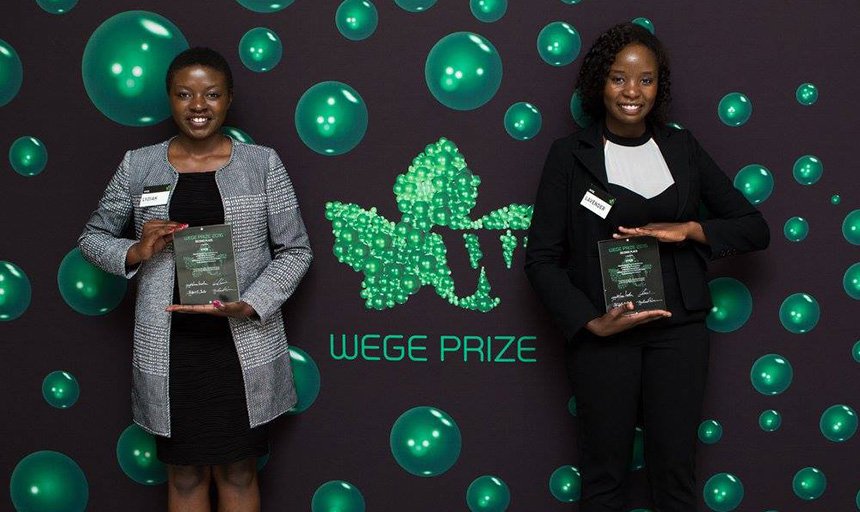Roanoke students address urban slum conditions and place second in global competition
June 22, 2016

Two Roanoke students, who grew up in Kenya, joined three other Kenyan women to work to improve living conditions in the impoverished urban areas of their home country. Their efforts earned a second place in the Wege Prize 2016 competition, a global student design competition focused on the circular economy - an industrial economy that produces no waste and pollution. The second-place win, over teams from Arizona State University, Aquinas College, University of Michigan and Rice University, earned the team $10,000 to help implement their idea.
Lydiah Mpyisi and Lavender Micalo were part of the Kenyan Youths for a Circular Economy (KYCE) team. Mpyisi graduated from Roanoke in May with a double major in environmental studies and biology. Micalo is a rising junior majoring in biochemistry.
KYCE unveiled an ambitious plan to improve the poor economic and sanitary conditions of Kibera, Kenya's largest urban slum, where the two women were born and have spent a majority of their lives. In Kibera, overpopulation, poverty, and a lack of proper sanitation facilities have resulted in a number of growing environmental and personal health problems including disease, pollution, and lack of access to clean water.
"According to the judges, they were particularly moved by the fact that we were born and raised in the Kibera slums and that we have worked our way to the United States and are working towards developing the slums," Mpyisi said.
"In fact, one of the judges, Colin Webster, who is an Education Programme Manager for the Ellen MacArthur Foundation in Edinburgh, United Kingdom, talked to us personally to let us know of how impressed he was by our project. He wants to be our coach and he wants us to give a talk about our project. We are humbled by the turn of events and are now, more than ever before, committed to implementing this project."
KYCE team members, which included Micalo, Mpyisi and students from Westchester Community College in New York, Anglia Ruskin University in the United Kingdom and EARTH University in Costa Rica, initially met at the Millennium Campus Conference in New York City at the United Nations headquarters, Micalo said. "During the conference we began talking about how we could come together as Kenyan youths to help our country achieve the sustainability goals that were adopted by the U.N. in 2015," she said. "A few months later we heard about Wege Prize and wanted to get involved."
Quote
Being named a finalist in a global competition like Wege Prize really gave us a voice to approach these organizations and prove to them that our idea is worth listening to.
Lydiah Mypisi '16
"We wanted to integrate existing community-based organizations and work together with the government and the locals to come up with solutions that can disrupt the existing wicked problems in Kenya's urban slums," added Mpyisi, who presented her team's solution in the final stage of the competition.
By orchestrating a collaboration between Peepoople, a nonprofit that manufactures and distributes portable toilets that transform human waste into valuable fertilizer; the Community Cooker Foundation, a nonprofit that works to provide communities with bio-digesters that can transform environmental waste into energy; and the Kenyan government, KYCE plans to pave the way for a circular system in which Kibera's most formidable problems can become assets for growth and development.
"We really appreciated that team KYCE chose to work on a problem in a context that they had personal connection to," said Gretchen Hooker, a Wege Prize judge who works as a Biomimicry Specialist for the Biomimicry Institute. "Their system redesign leverages existing resources in the community in new ways and meets an acute need affecting many people."
KYCE has already begun connecting with Peepoople, The Community Cooker, and local Kenyan governments to put their plan into action. They hope to use the Wege Prize funds to help formalize the necessary partnerships and resources to move their idea forward.
"We're now going to start finalizing all of our partnerships on paper, and we also want to take steps to ensure that our project is sustainable, and that the change we want to see happen in Kibera actually does happen," said Mpyisi. "Being named a finalist in a global competition like Wege Prize really gave us a voice to approach these organizations and prove to them that our idea is worth listening to."
Details on Wege Prize 2016 and future competitions can be found at wegeprize.org.